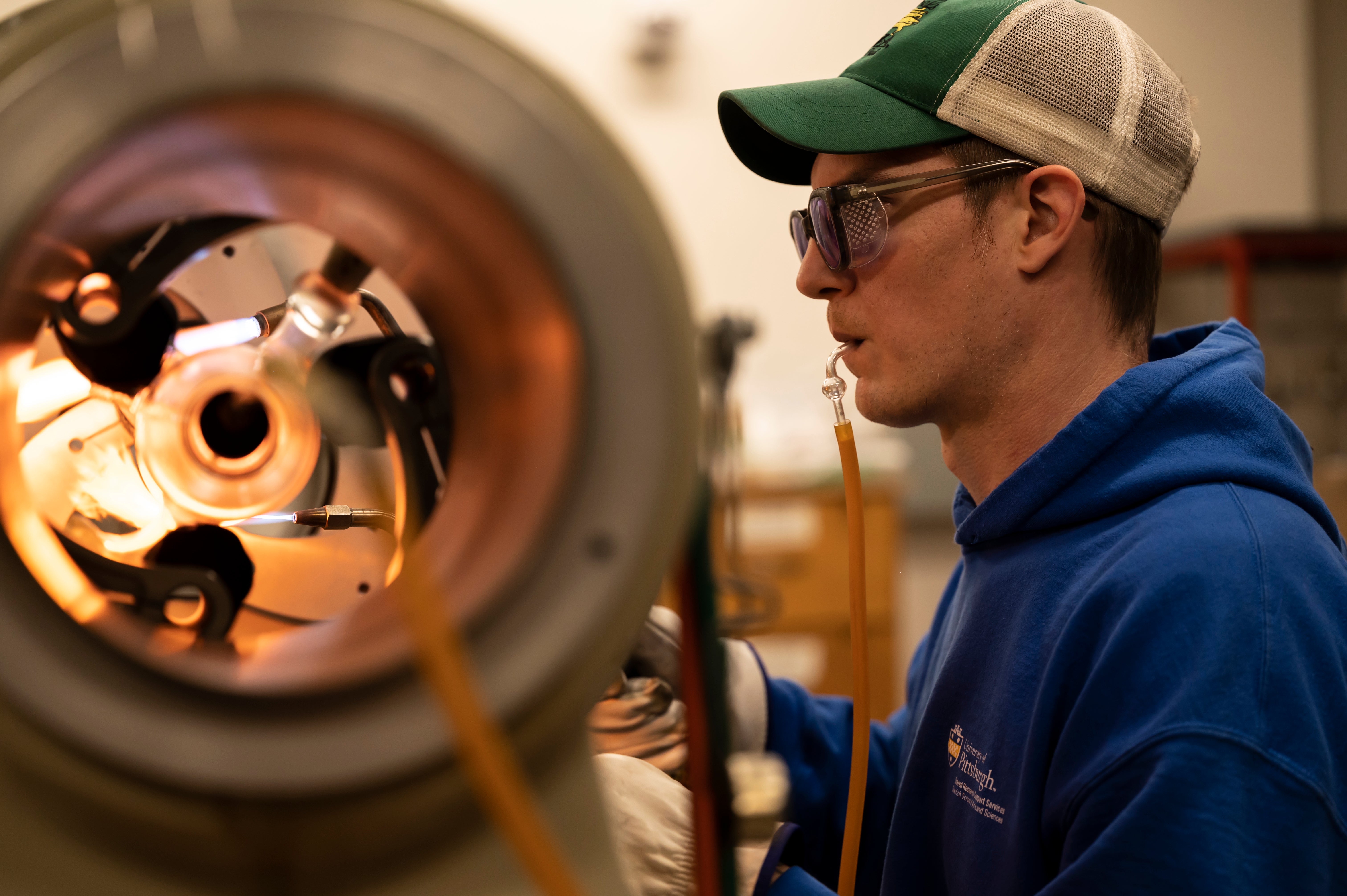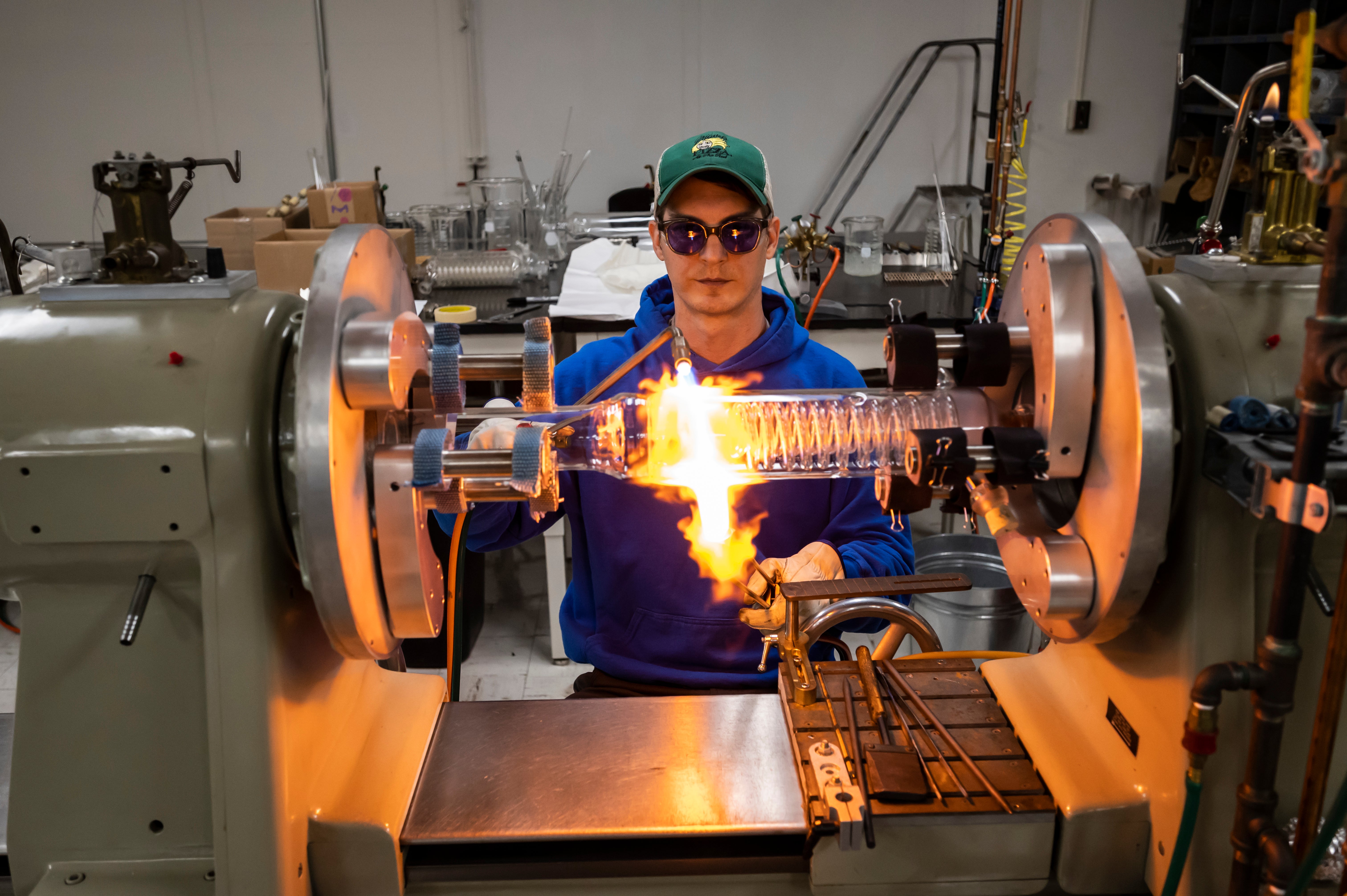This article was originally published in PittWire.
Repairing a $3,000 glass apparatus, cutting a rare crystal for use in quantum technology, working quartz that glows brighter than the sun: It’s all in a day’s work for Pitt’s scientific glassblower Ryan Tate.
Tate leads Pitt’s glass shop, part of the Shared Research Support Services office in the Kenneth P. Dietrich School of Arts and Sciences, where he creates and repairs flasks, piping and more complicated systems used to conduct research across the University. He’s taking part in a time-honored tradition: Science and glass have long been inseparable.
“Glass has been involved in seven out of the 10 most important inventions for humanity,” he said. “Everything from antibiotics to all the laser research that’s going on right now, it all has to do with glass.”
And yet, Tate is somewhat of a rarity these days. Tate attended a specialized program at Salem Community College in New Jersey and worked in industry before coming to Pitt. He’s the only scientific glassblower in Western Pennsylvania, putting him in demand not just at Pitt but for researchers at Carnegie Mellon University and Duquesne University, too. Combined, they keep him busy, sometimes with dozens of projects a month.
For Tate, glass is a lifelong vocation. Growing up, he saw scientific glassblowing in a magazine at his uncle’s shop — and soon after he began showing up at a local scientific glass shop at seven in the morning to sweep the floors every day. The experience began a love affair that continues to this day.
“It’s like playing adult Legos all day,” he said. “I get such gratification just from making stuff. And then I can even go into a lab and give it to somebody and a week later I can watch them use it. That tickles me to death.”
Researchers at Pitt who need glassware repaired only pay the shop for parts, not labor, saving the hundreds or thousands of dollars and months of waiting it would take to get the fix offsite. Tate also works with researchers to develop custom parts for their projects, figuring out the necessary parts and materials and determining what kinds of stresses the apparatus will be under. It’s a level of communication and feedback researchers would be hard-pressed to find if they went commercial.
“Somebody can design something and come into my shop, we sit down and sketch it out,” he said. “We have to figure out how the researchers are using it, how the machine works, everything around the problem.”


Sometimes projects require days’ or weeks’ worth of planning, such as when Tate had to figure out how to cut and polish an exotic crystal for use in the lab of Physics and Astronomy Assistant Professor Tom Purdy. Other jobs require special preparation, such as when he works with quartz glass rather than the borosilicate that’s his bread and butter. Quartz handles heat better than other types of glass, so it’s often used in labs that work at high temperatures — but working it is a unique challenge.
“When quartz gets hot enough, it emits light brighter than the sun,” Tate said. “Anything the light touches gets hot. I literally have to put on sunscreen, reflective gear, the whole nine.”
Projects like these make Tate’s job unique even at an institution as large as Pitt. Leading the glass shop takes discipline and precision and has also required Tate to learn the needs of researchers across the gamut of scientific fields that the University offers.
“I work for so many different departments — radiology, geology, physics, chemistry, over into plastic surgery — it’s all over the place,” he said. “I don't know what's going to come in the door next, and that’s exciting.”
— Patrick Monahan, video by Alex Mowrey, photography by Aimee Obidzinski
